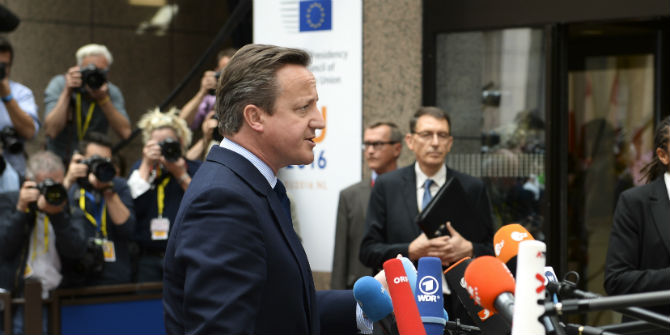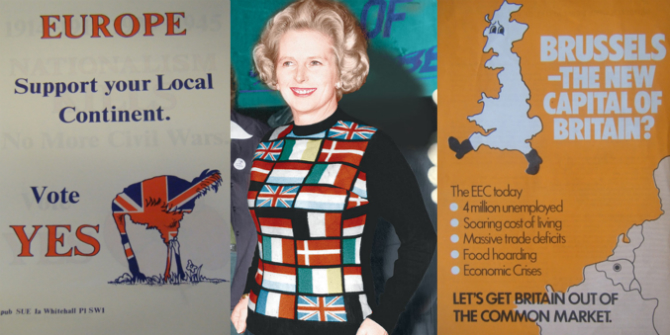 The vote to Leave was a huge blow, says Simon Hix (LSE). But with so few British politicians willing to engage with the EU’s political project, the threat of Brexit had been apparent for some time. He sets out a plan that could see Britain eventually enjoy a relationship with the EU that resembles Canada’s with the United States. A ‘quick divorce’ under Article 50 would be followed by exit negotiations during which Britain would remain a member of the EEA, with some restrictions on free movement. However, the EEA is not a long-term proposition, and we would eventually have to move to an ‘association agreement’. None of this will be easy.
The vote to Leave was a huge blow, says Simon Hix (LSE). But with so few British politicians willing to engage with the EU’s political project, the threat of Brexit had been apparent for some time. He sets out a plan that could see Britain eventually enjoy a relationship with the EU that resembles Canada’s with the United States. A ‘quick divorce’ under Article 50 would be followed by exit negotiations during which Britain would remain a member of the EEA, with some restrictions on free movement. However, the EEA is not a long-term proposition, and we would eventually have to move to an ‘association agreement’. None of this will be easy.
So we have voted to leave the European Union. I was not in favour of this, but accept the outcome as legitimate. It is a huge blow to me professionally, as I have researched and taught EU politics for 25 years.

And at a personal level, the most upsetting part was telling my 12- and 15-year-old kids on Friday morning, and then sharing their tears and anger. “How did you guys let this happen? Will my friends have to leave Britain? What if I want to live in France or Spain? What will happen to our cousins in Holland? Why are you old people so selfish?”, and so on.But, these, I hope, are short-term considerations, all of which can be addressed positively. And, if I am honest, I have understood for a long time that the EU is primarily a political project, rather than just an economic one, and as such there is not much point in the UK being part of the project if our political elites are not willing to acknowledge that and engage sufficiently as a result.
For example, I have frequently pointed out how the UK has become more isolated in the past 5 years – with the fake “veto” over the fiscal compact treaty, the voluntary opt-out of the battle for the Commission Presidency in 2014, and our increasing voting isolation in the EU institutions. Put simply, we have been heading for Brexit for some time.
So, the real questions are: What happens now? What should be the long-term relationship between the UK and the EU? And how should this be designed in the best interests of both the UK and the EU – to maximise the economic and social opportunities for our citizens, and to protect our separate and collective economic and political security?
The model I would like us to aim for is something similar to the relationship between Canada and the United States, with the UK the Canada to the EU’s United States.

Canada and the US have a broad free trade agreement, are close political and security allies, and act together on many global issues, such as climate change, global free trade, fighting terrorism, and so on. Surely it is not beyond our collective intellectual and political capacity to work out a way for us to build something similar, and quickly.
‘Quick divorce’
What would be the steps? First, we should negotiate a “quick divorce”, via the Article 50 mechanism. These negotiations should focus on rights of EU citizens in the UK and UK citizens in the EU, the remaining UK payments into the EU budget, and confirming private economic contracts.
The most logical timetable is that the divorce terms are agreed within six to nine months, and the separation starts from 1 January 2020.
This date would fit well with the UK and the EU’s political timetables, as we are likely to have an election in May 2020, and the current multi-annual EU budget, and Commission and European Parliament terms ends in 2019.
As for the content of the divorce, there should be a quick agreement to grant “permanent residence status”, or the equivalent, to all EU citizens currently in the UK and all UK citizens currently elsewhere in the UK. This should be agreed quickly, to minimise the stress and panic, and would send a strong signal of the direction of travel.
This might be tricky with no negotiating partner on the British side for at least four months. But, if there could be agreement amongst the candidates for the Conservative leadership, once they have been announced, and with support from the Labour Party, then presumably the basic elements of such an arrangement could be agreed quickly, and then rubber-stamped at a later date.
Joining the EEA – until negotiations are over
Alongside the separation negotiations, there will need to be discussions about the future relationship between the UK and EU. This could not be agreed under Article 50, as it would inevitably need to be adopted unanimously by the remaining EU member states and by a majority in the European Parliament, and would need to be ratified domestically in all 27 countries, which might involve several national referendums (especially in France).
Because of this, these negotiations are likely to be drawn-out, highly politically charged on both sides, and could be derailed at several points. The uncertainty this would provoke could be economically disastrous for the UK and the EU, with capital flight to safer havens, banks moving staff from London to Frankfurt and Dublin or even Singapore and New York, and manufacturing firms shifting production to the continent or Asia.
Meanwhile, Putin will increase his meddling in Eastern Europe and may well provoke trouble in the Baltic states.
To avoid this, I strongly recommend that during the Article 50 separation negotiations we request to move out of the EU into the European Economic Area (EEA), as an interim step until a final agreement is reach, whether this is a comprehensive free trade agreement, or an association agreement, or something else.
This would allow the UK to remain in the single market, with full free movement of goods, services and capital, which would include allowing UK financial services “passporting” rights in the single market.
The tricky issue, of course, will be the free movement of people. Currently, being in the EEA means accepting full free movement of people. As UK membership of the EEA is likely to be temporary, I would favour a special agreement on the free movement of people.
For example, this could be an “emergency brake”, such as a cap on the number of work permits/social security numbers the UK grants each year to EU workers and that the EU member states grant to UK workers.
Moving on
Membership of the EEA would not be sustainable in the long-term, however, as it would inevitably mean surrendering even more sovereignty than being a member of the EU, as we would have to accept EU single market rules, without any say over them. So, in the longer term, the aim should be a new EU-UK “association agreement”, which could preserve UK membership of the single market as much as possible, including some form of freedom of movement of people, and with some new institutional arrangement which enables the UK to be involved in the agreement of common rules for both markets. But as the breadth of such an agreement – and the precise nature of any decision-making rules – will be difficult for both sides, I would not want to say too much now about how this eventually might work.
Building support in the UK
In the short term, though, agreeing UK interim membership of the EEA is going to be difficult to sell domestically, both in the UK and in the remaining EU states. In UK politics, such an arrangement is not what the VoteLeave or Leave.EU campaigns called for. EEA membership is certainly not “taking back control”!
But what was clear during the campaign, and has become even clearer since the vote, is that the Leave campaign was divided between two very different post-Brexit narratives. One narrative was more nationalist and isolationist, focussing on immigration, rights for British workers, access to public services, and the anger of people against the elites. A different narrative was more “national libertarian”: an odd form of libertarian thinking, that advocates full national sovereignty but with maximised free trade and free global transactions.
The best example of this view was the “Liberal Case for Leave” paper by Roland Smith for the Adam Smith Institute. Whereas Nigel Farage and Priti Patel were closer to the former narrative, Michael Gove, Daniel Hannan and Gisela Stuart were closer to the latter narrative, with Boris flip-flopping back and forth between the two.
[As an aside, this national-libertarian view is a little odd, as surely being a full member of the single market, with complete removal of barriers to the free movement of goods, services, capital and people is a libertarians’ dream, and far more “free” than any trade agreement between the UK and EU, which would only ever cover a sub-set of goods and some services].
This split in the Leave campaign should enable a broad coalition to be built, which brings together elements of both the Leave and Remain campaigns, in support of an open and cosmopolitan view of a close social, economic and political relationship between the UK and the EU. This coalition would include almost everyone on the Remain side, as such an arrangement would be as close as possible to what they wanted on 23 June, as well as the “national libertarian” wing of the Leave campaign. I have no doubt that such a coalition would command a large majority amongst the British public – although probably not most supporters of UKIP.
Key to building this coalition will be the response of the Labour Party. There, new leadership is probably needed, and the new leader should quickly come out in support of accepting Brexit but advocating the closest possible relationship between the UK and the EU going forward.
The other aspect of the 52-48 outcome is that we are not just a democracy, but also a liberal democracy. In other words, we accept majority rule, but not dictatorship of the majority against the interests of a minority. We deal with this in elections, because they are only temporary, but the danger of a Brexit is that it is a permanent removal of the rights and interests of the minority. This in part is what is driving the call for a second referendum.
Only a new political coalition which recognises the legitimacy of the interests and views of the majority of Remain supporters can heal this split and be consistent with the underlying norms of our constitutional and political history. Furthermore, the UK remaining in the EEA in the interim and then a comprehensive association agreement might be the best hope for saving our own union of nations.
If we fail to reach an agreement on a comprehensive and open relationship between the UK and the EU, and the UK is cast out into the cold, in glorious isolation, then I could see a strong case – both politically and economically – for Scotland and Northern Ireland to leave an isolationist UK in order to remain in the EU.
The risks for the EU
Finally, this strategy might sound reasonable and feasible from the UK’s side. But do not expect this to be easy for the EU. The economic interest of the EU, and particularly Germany, will be to reach a quick agreement with the UK. After all, the UK would be the EU’s and Germany’s largest external trading partner, representing about 16 per cent of total EU external trade. The German car industry, French wine producers and Spanish tomato growers will be pressing their governments to allow the UK to remain a full member of the single market in the interim and for there to be a broad free trade agreement in the longer term.
However, other economic interests will be pushing on the other side. In particular, Frankfurt and Paris will see Brexit as an opportunity to take business away from the City of London, and so will argue against allowing UK financial services firms passporting rights in ‘their’ single market.
But the politics is likely to be far more difficult than the economics, because of the real and present fear of potential contagion of Brexit to other countries. If the Brexit process seems easy, with few economic costs and some sovereignty gains, there will be huge pressure for similar in/out referendums in other countries, such as the Netherlands, Denmark, Sweden, Austria, Hungary, and potentially even France and Italy. Populist right parties in all these countries are already mobilising, and if any manages to secure a parliamentary majority, then this could trigger an exit referendum. Some UKIP supporters might like to see the collapse of the EU. But I do not believe that even the majority of Leave supporters would favour that, as the knock-on effects economically and politically on the UK would be far greater than Brexit alone.
Against the fear of contagion and collapse, the elites in Berlin, Paris, Rome, Madrid and Brussels will have a powerful incentive to make the Brexit process as painful as possible for the UK, both economically and politically. We are already starting to hear these sentiments from various parts of Europe. As Jean-Claude Juncker put it: “This will not be an amicable divorce”.
We are in for a bumpy ride, for sure. And there is a real possibility that the Brexit process could go badly wrong and we could end up with a more closed, smaller, poorer, weaker, and more isolated England and Wales on the north-west periphery of a collapsing continent.
As of today, I am not confident that the Conservative Party or the Labour Party will elect someone who understands the issues in sufficient detail or who understands the EU’s political and economic sensitivities well enough to be able to negotiate the best deal for Britain and the EU.
As the governing party, it is in all of our interests that the Conservative Party elects a leader who can command broad support across the Leave-Remain divide.
But I remain optimistic. I have faith that there is a majority in the UK as well as in the rest of our European continent for a long-term relationship between Britain and the European Union which is close, warm, open and free – like the relationship between Canada and the United States.
We need to work hard to make sure that we end up in that place, and not somewhere isolated and dark, which could unleash terrifying forces across our continent.
This post represents the views of the author and not those of the BrexitVote blog, nor the LSE. It was first published by the Times’ Red Box.







Dear Mr Hix,
I wish I could share your optimism.
There are at least a few significant differences between the UK’s relationship with the EU and Canada’s relationship with the USA which you have not addressed.
1. The UK is facing imminent fragmentation. So this would be more like Ontario, Alberta, Saskatchewan and British Columbia negotiating with the USA whilst Quebec tries to declare independence and Manitoba has no idea what it wants to do except avoid sectarian violence! This would make any settlement inherently unstable.
2. Canada and the USA have never declared war on each other. England, Scotland, France, Spain and Germany (including its predecessor states) have declared war on each other at least dozens, if not hundreds, of times in the last five centuries. The historical evidence for a legally binding obligation for co-operation is clear.
3. The 52% who voted leave were led to believe that ‘Brexit’ would ‘make Britain great again’. Accepting the position as a junior partner in international affairs and a perennial economic rule taker is unlikely to satisfy the political demands whipped up by the Leave campaign.
I wish that the UK could accept its post colonial role in the World and become a constructive member of the Global community but it seems that the egos of David Cameron, Boris Johnson and Nigel Farage will not allow that to happen.
This article refers to the UK “Joining the EEA”.
But surely the UK is already a member state of the EEA.
Moreover, the referendum result provides no mandate for leaving it, only for leaving the EU.
@Alex
The UK is facing imminent fragmentation? I’ll believe it when I see it. Canada, meanwhile, has faced a secessionist threat from Quebec for half a century now. As recently as the 1990s, Quebec held a referendum on independence and failed by less than 1% of the vote. That was a hell of a lot closer than the SNP’s 10%+ defeat in 2014.
Canada and the USA have never declared war on each other? Um, perhaps you should look up the “War of 1812” sometime. Fact is, Canadian-US relations were poor until after World War I. Technically, as Canada was a British colony in 1812, the US declared war on Britain and not Canada, but as the US went to war to seize Canada while Britain was apparently losing its contest with Napoleon Bonaparte, that’s distinction without difference. This also leaves out numerous border clashes and the Fenian raids of the 1860s…
Also, given we have fought wars with the US, China, Japan, Argentina and so on, why does your argument “The historical evidence for a legally binding obligation for co-operation is clear,” not apply to them?
As one of the 52%, I voted to make Britain once again, a sovereign independent nation — just like Canada, Australia, New Zealand, Iceland, Greenland, Japan, the USA and so on — all of which are part of the global community. Just as we are and will be. The EU does not equal the global community.
Membership of the EEC (And Hicks has lifted his ideas lock stock and barrel from Richard North’s eureferendum.com site) would be a temporary situation. We wouldn’t, in the end, be subordinate to anyone.
Least of all a continent whose economies are in relative decline and whose indigenous populations are in absolute decline.